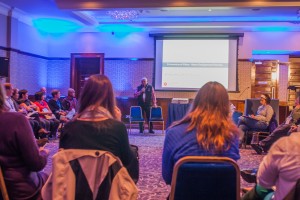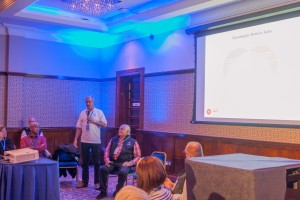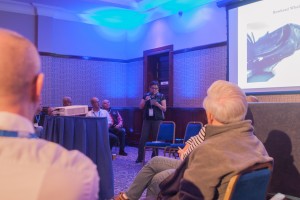By: Dan Kreuger
"The English can trace their history in this land back some 400-800 years, and then they have to go somewhere else. We Irish - we trace our history here back to the Irish dinosaur, if you know what I mean..." says our guide Caven, with his thick brogue accent and unyielding wit. He looks at me with an inquisitive smile. I nod. He means “time immemorial.”
 Indigenous peoples around the world have a connection to the land that is sometimes difficult for the global-minded to fully comprehend. This connection is a part of the indigenous identity. In Ireland, the Gaelic word Tenalach is used to describe a deep connection with the land, air and water: a connection that runs so deep that it allows one to literally hear the Earth sing.
Indigenous peoples around the world have a connection to the land that is sometimes difficult for the global-minded to fully comprehend. This connection is a part of the indigenous identity. In Ireland, the Gaelic word Tenalach is used to describe a deep connection with the land, air and water: a connection that runs so deep that it allows one to literally hear the Earth sing.
Acknowledging that connection is one of the first steps to understanding and developing an authentic and sustainable indigenous tourism experience. From the perspective of an indigenous worldview, people cannot be divorced from the land and the land cannot be separated from the people. Therefore, it is not enough to simply frame our tourism offerings as a mechanism for creating local jobs. Jobs are only one piece of the whole and rarely the most important element of daily life in a local community.
In October, people gathered from all corners of the earth to share their ideas, experiences and questions at the 2014 Adventure Travel World Summit in Killarney, Ireland. Ben Sherman, chairman of the World Indigenous Tourism Alliance (WINTA), co-led two break-out sessions that explored the value and economics of a values-based indigenous business model for tourism.
"The capitalist economy is failing our local people,” Sherman explained. "Indigenous communities are fundamentally based on sharing, interdependency, kinship, and a sense of 'enoughness'. Balance and harmony are not pie-in-the-sky tree hugger ideals", he continued. "Accumulating [material] wealth is not our sole priority … Prosperity for us is defined by our continued ability to live in the natural world."
This sentiment was underscored during the plenary session on Conservation Travel, when World Wildlife Fund’s (WWF) Jeffrey Parrish called upon the industry to "sustain the places and peoples that sustain the very profitability of the adventure travel industry.”
 The take-home message is that we as an industry need to go beyond the mainstream business-for-profit model to embrace the so-called Quadruple Bottom-Line, which identifies “purpose” (community well-being) as a core value in addition to “people,” “planet,” and “profit.” It is about choosing to become a part of the “nascent restorative economy,” as shared by Jim Sano of WWF.
The take-home message is that we as an industry need to go beyond the mainstream business-for-profit model to embrace the so-called Quadruple Bottom-Line, which identifies “purpose” (community well-being) as a core value in addition to “people,” “planet,” and “profit.” It is about choosing to become a part of the “nascent restorative economy,” as shared by Jim Sano of WWF.
How exactly we might achieve this was explored by participants in the indigenous tourism break-out sessions. It was noted a number of times that if all we are trying to do is make local indigenous communities fit better into the mainstream tourism model (i.e. making them more like us), then we have already lost. To be agents of change, we need to think differently. We need to begin looking inward, asking ourselves, "How can we change the industry of adventure travel to be a better fit for indigenous peoples and cultures, for their local needs, their values, and the realities of their day-to-day life?"
In shifting our lens, looking inward at how we do business with local peoples, we open up a new and exciting conversation. We see organizations like Spirit of Africa, who are pioneering meaningful peer-to-peer relationships between visitors and hosts. They are crafting experiences that actively seek to bring new skills, knowledge and friendships into the local community in addition to jobs. They are facilitating authentic connections between outsiders and insiders, thereby avoiding “fishbowl tourism” and instead propagating a mutual understanding that is built upon respect, dignity, and a shared humanity.
 This change in perspective also sheds new light on how the industry might help address the various challenges commonly expressed when working with local indigenous communities. "We need your help" responded Sherman, when asked to comment on concerns about response times, client expectations and packaged itineraries. "Instead of looking for a finished product,” he offers, "find the people, reach out to them, and help them refine the experience. Partnerships and collaboration are the key to our mutual success."
This change in perspective also sheds new light on how the industry might help address the various challenges commonly expressed when working with local indigenous communities. "We need your help" responded Sherman, when asked to comment on concerns about response times, client expectations and packaged itineraries. "Instead of looking for a finished product,” he offers, "find the people, reach out to them, and help them refine the experience. Partnerships and collaboration are the key to our mutual success."
How our industry markets, builds itineraries, crafts experiences and educates visitors all present tangible opportunities to change how we fundamentally do business. Using a human-centered approach to reimagine and redesign our industry to enhance community well-being is a tantalizing prospect. For now, there are more questions than answers. However, to quote the ATTA’s Chris Doyle in his opening statement, "This is only the beginning." And as one participant pointed out, "Having all the answers is far less important than having the conversation."
